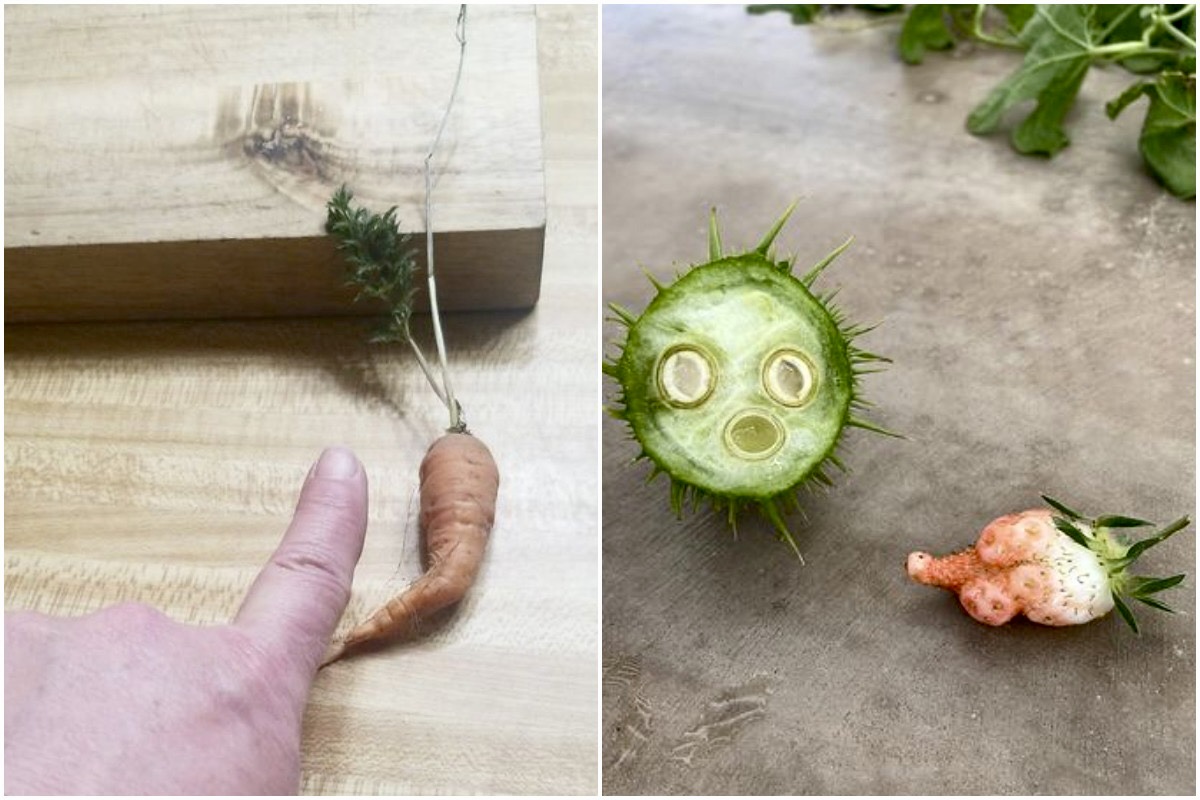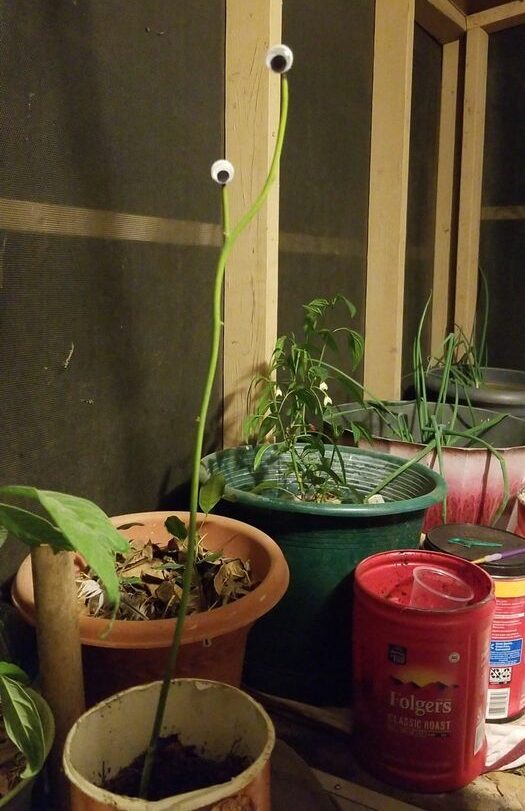It’s Time to Celebrate Our Gardening Failures
Forget the picture-perfect garden photos. Instead, turn to this Facebook oasis of crappy yields and disappointing starts.
It’s Time to Celebrate Our Gardening Failures
Forget the picture-perfect garden photos. Instead, turn to this Facebook oasis of crappy yields and disappointing starts.

Not everyone can be a winner.courtesy of gardeners.
There’s a particular feeling—a mixture of astonishment and smug satisfaction—that pops up the first time you successfully grow something. Whether it’s plucking a perfectly red tomato from your very own vine or seeing that first hint of a spring crocus breaking through the lifeless dirt, the feeling comes on strong.
This story is not about that feeling.
This story is about all the tomatoes that drooped, mealy and green, from a sad, yellowing balcony plant. It’s about the crocus leaf you find desiccated after a deer got to it first. This is for all of your farming and gardening failures, which deserve a moment in the spotlight. And where else to celebrate those momentous non-achievements but the Facebook group called Shitty Harvests?
“What else are you gonna do? Just sit and cry?” asks Anthony, a gardener and group member from Minnesota, who says that, after a good commiserating laugh, people will chime in to help. “Hey, kudos to you on a terrible failure. Big high five! But also, have you tried this?”
Shitty Harvests boasts more than 53,000 members. And these are incredibly active and engaged members. They post pictures of their wonky carrots, their laughably small potatoes, their miniature strawberries. They ask for advice and share what worked—and more often, what didn’t work. The group isn’t just a font of information for gardeners of all experience levels. It can also be a reminder that things are OK. Your cucumbers failed, but you’re doing fine.
“There’s the reassurance in other peoples failures; this isn’t just me. This isn’t just my climate. This is just how hard it really can be,” Adrienne, a member from Southern California, says. “It’s nice to have this unpretentious group. I’ve learned a lot, even though we’re all supposedly a bunch of crappy gardeners. It’s a judgment-free zone.”
Adrienne joined the group when she and her husband attempted to grow a salsa garden. They are both interested in off-grid living and like the idea of producing their own food. She says that even though she knew gardening was tough, there was always the idea that it was really just as simple as seeds, water and time.
So, how did the salsa garden do? “Oh, it didn’t. Our tomato plant got about nine feet tall and produced two tomatoes. And then we got hornworms, which are the craziest-looking things,” Adrienne laughs. “We have four pepper plants that are alive, but they’re all shriveled. One has no leaves and three sad jalapenos on it. We had a gopher eat half of the other pepper plants. So, we got about four quarts of salsa out of a year of work.”
Despite the continual frustration, Adrienne says the community she’s found in the Shitty Harvests group is part of why she’s stuck with the garden. “It’s fun to see what happens next and adjust and problem solve.” That feeling is echoed in the posts throughout the page, as people share why it’s important to thin your seedlings or how to keep the racoons away.
For Annie, a novice gardener of only three years living in southern Utah, the group helps her keep a sense of humor about her efforts, like Steve, her avocado tree. A single leggy shoot, pushing upward from an old coffee can, Annie has been trying to get Steve to grow for years. Unfortunately, things aren’t looking great for him. So, Annie pasted some googly eyes on Steve and shared the picture with the group. “I don’t think Steve’s going to make it, to be honest,” Annie jokes.

But why go public with these failures? Annie could have just as easily tossed Steve to the compost bin and never looked back. Why post about it on the internet? “It’s funny to share,” she explains. “For the first two years, I really didn’t have anybody to share with. I would have loved [this group].” This community, varied in geography and ability, is an important connection point for many home gardeners. It’s a chance to show that you’re trying and to feel validated for doing so. You may not always succeed, but it’s the effort that counts.
Still, Annie’s learned a lot from Steve’s failure to thrive. Annie describes herself as a “hazard gardener,” throwing ideas out and seeing what works. “Every year that I have success with something, I feel more confident in my ability.”
That’s a feeling Anthony knows well. A self-described masochist, he mainly grows hot peppers, even in his cold Minnesota climate. After starting his garden with common crops, he found some basic pepper starts at his local nursery. He grew a few habaneros, a few serranos and found some success. It spurred him on. “Over the past few years, I went further down the rabbit hole into the hot pepper world, collecting more exotic seeds and working on my indoor germinating game,” Anthony says. “Then, I got into fermenting food and hot sauce. And this year, I’m doing some powders and seasonings.” An early success has led to a whole garden of pepper pods, just waiting to be picked—that is, if the deer don’t get to them first. In the Shitty Harvests group, Anthony has posted about the wildlife decimating his strawberries and his failure at getting his indoor seedlings to germinate. Each time, he shares a moment with the group to offer up a bit of collective laughter, a cathartic moment. But it’s also to encourage others to give gardening a try, despite the relative hardship.
“During the course of COVID and lockdowns, there’s a scarcity of food and inflation keeps going up. People are finding the benefits of at least attempting to grow their own food, and seeds are flying off the shelf,” Anthony says. He’s happy to welcome each and every new gardener to the flock. “It’s great. There’s a whole new crop of people epically failing at gardening.”
Follow us
This work is licensed under a Creative Commons Attribution-NoDerivatives 4.0 International License.
Want to republish a Modern Farmer story?
We are happy for Modern Farmer stories to be shared, and encourage you to republish our articles for your audience. When doing so, we ask that you follow these guidelines:
Please credit us and our writers
For the author byline, please use “Author Name, Modern Farmer.” At the top of our stories, if on the web, please include this text and link: “This story was originally published by Modern Farmer.”
Please make sure to include a link back to either our home page or the article URL.
At the bottom of the story, please include the following text:
“Modern Farmer is a nonprofit initiative dedicated to raising awareness and catalyzing action at the intersection of food, agriculture, and society. Read more at <link>Modern Farmer</link>.”
Use our widget
We’d like to be able to track our stories, so we ask that if you republish our content, you do so using our widget (located on the left hand side of the article). The HTML code has a built-in tracker that tells us the data and domain where the story was published, as well as view counts.
Check the image requirements
It’s your responsibility to confirm you're licensed to republish images in our articles. Some images, such as those from commercial providers, don't allow their images to be republished without permission or payment. Copyright terms are generally listed in the image caption and attribution. You are welcome to omit our images or substitute with your own. Charts and interactive graphics follow the same rules.
Don’t change too much. Or, ask us first.
Articles must be republished in their entirety. It’s okay to change references to time (“today” to “yesterday”) or location (“Iowa City, IA” to “here”). But please keep everything else the same.
If you feel strongly that a more material edit needs to be made, get in touch with us at [email protected]. We’re happy to discuss it with the original author, but we must have prior approval for changes before publication.
Special cases
Extracts. You may run the first few lines or paragraphs of the article and then say: “Read the full article at Modern Farmer” with a link back to the original article.
Quotes. You may quote authors provided you include a link back to the article URL.
Translations. These require writer approval. To inquire about translation of a Modern Farmer article, contact us at [email protected]
Signed consent / copyright release forms. These are not required, provided you are following these guidelines.
Print. Articles can be republished in print under these same rules, with the exception that you do not need to include the links.
Tag us
When sharing the story on social media, please tag us using the following: - Twitter (@ModFarm) - Facebook (@ModernFarmerMedia) - Instagram (@modfarm)
Use our content respectfully
Modern Farmer is a nonprofit and as such we share our content for free and in good faith in order to reach new audiences. Respectfully,
No selling ads against our stories. It’s okay to put our stories on pages with ads.
Don’t republish our material wholesale, or automatically; you need to select stories to be republished individually.
You have no rights to sell, license, syndicate, or otherwise represent yourself as the authorized owner of our material to any third parties. This means that you cannot actively publish or submit our work for syndication to third party platforms or apps like Apple News or Google News. We understand that publishers cannot fully control when certain third parties automatically summarize or crawl content from publishers’ own sites.
Keep in touch
We want to hear from you if you love Modern Farmer content, have a collaboration idea, or anything else to share. As a nonprofit outlet, we work in service of our community and are always open to comments, feedback, and ideas. Contact us at [email protected].by Emily Baron Cadloff, Modern Farmer
April 27, 2022
Modern Farmer Weekly
Solutions Hub
Innovations, ideas and inspiration. Actionable solutions for a resilient food system.
ExploreExplore other topics
Share With Us
We want to hear from Modern Farmer readers who have thoughtful commentary, actionable solutions, or helpful ideas to share.
SubmitNecessary cookies are absolutely essential for the website to function properly. This category only includes cookies that ensures basic functionalities and security features of the website. These cookies do not store any personal information.
Any cookies that may not be particularly necessary for the website to function and are used specifically to collect user personal data via analytics, ads, other embedded contents are termed as non-necessary cookies.
Failure that makes garden yields better, that’s also what I feel after failing from the first harvest, learning from failure. Even though at the beginning I was disappointed with good seeds, the results were not satisfactory, but gardening is a process of reaping the fruits of hard work
Every failure is one step closer to success. Never give up, always keep trying.